|
Birds of Paradise Maeve pecked at dysentery and cholera while Netty sang softly to the earthly bodies and stark moon children among the dung and grass fires nested on smoked fields She didn’t care that Netty called herself nurse as long as she could do a decent bandage in shimmering heat as an endless line shuffled passed the committee of soldiers in ball caps their curved beaks circling over the dying A better place Netty overheard and All the food you can eat as a laying-on of hands began and a clutch of children grew larger The world needs to know mother Netty chirped as Maeve her shift feathered red finished the suture of a women’s stump-leg in the back of a pick-up truck ~ The reporter behind the sand bagged wall tapped hawkishly on his notepad then stared at it with his head cocked and did another flourish when he noticed a woman hovering nearby She stepped closer her hands flapping in front giving flight to words that fell in tears of dust 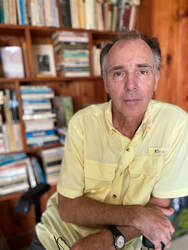 After struggling with music, Inman began writing to deal with the rhythms in his head. His teacher eventually suggested poetry to “get that flowery shit” out of his work. An American war resister who had studied at U of T during the tail end of the Frye/McLuhan era, she loved holding class in museums where she’d talk about Impressionism and working-class life in landscape. “You should write like that in your blue collar style,” she said, pointing at peasants gleaning fields in a mountain's shadow. Inman has six books of poetry. His latest are The War Poems: Screaming at Heaven, SEAsia (pronounced Seize-ya) and The Way History Dries, all from Black Moss Press. His books tend to work like novels. His themes link character to landscape.
0 Comments
How to Feed a Sea of People Consider the rice, said the water, for I am its beginning and its end. I take its stalks, all of them gently in my wide muddy mouth. I hold each one by its root, washing it through. Slender on long legs, the rice dozes. In its emerald shift, it dreams of flamingoes and ladders, of endless perpendicularity. I soak and suck as if I were breathing through bamboo. I enter each silo, spiraled like a shell, each cathedral of green a controversy of vessels. The rice is an organpipe played to the glory of common grasses. I climb into the swaying spray of seeds setting, anticipating amber, too absorbed to notice the dry season. I have given the rice my all, molecular bind, covalence in its revolution of pineapple, palm, paper. And have you learned yet how to feed a sea of people? Swallowing requires steam. Forthwith let’s address the heat, the mouth, the hand. This poem owes its inception and form to the poem “How to Stuff a Pepper” by Nancy Willard, from her 1974 book CARPENTER OF THE SUN. Here I gratefully apply a simple cooking technique to the complex global agricultural challenge we face. You can hear this poem read aloud at https://bit.ly/HowToFeedASeaOfPeople  Heidi Mordhorst is the author of two collections of poetry for young readers as well as contributions to many anthologies, including LIFE IN ME LIKE GRASS ON FIRE (Maryland Writers’ Association). She serves on the NCTE Excellence in Poetry Award Committee and teaches public school PreK in Maryland. Find her at https://myjuicylittleuniverse.blogspot.com. News Story dead giraffes in the Kenyan bush dissolve like rancid butter in the heat of the unending drought emaciated cattle lie down in the desert sand serrated ribs sink into rivulets of erosion carved long before by extinct rain the village digs deep in the earth to find the trembling brown water lifted to the light bucket by bucket the four year old girl too weak to raise her head eyes like dead fish a childhood without a childhood where laughter never rains only dust so eager to devour and way to the North an oozing caramel of cars scarifies the land in toxic opulence and a child’s balloon is caught on power lines in dark descending twilight -- Boys brothers and cousins emerge from the family compound and follow snow-dusted lanes to the busy avenues in Kabul with their shoeshine kits a group of four in case they encounter hostile competition to earn a few coins worth an american nickel to buy bread to take home to family they wish they were in school to become doctors or engineers when they grow up but since their fathers have no work they shine shoes unless like this morning no one needs their services stomachs pang eyes are proud wait— a few pairs of shoes thrust out of a door the boys sit on the ground and work just enough for a bread split four ways after all workers have to be fed the veiled sun begins to descend in the grey winter sky behind minarets the mantle of responsibility doesn’t ward off the cold shoulders hunch forward night will be long again take the long way home in case fortune might smile and fill a few pockets with bread for the sisters mothers and the fathers who scratch proverbs in the dust with stunted sticks and count exhausted prayer beads simmering in frustration afraid to look in mirrors the boys’ shadows stretch homewards sweet delay of a few more transactions muffled laughter at an inside joke warm bread warms the hand child is father to the man give all a fair portion of dignity give all the means to be the lion will hold high his head  Argos MacCallum is an actor, director, carpenter, theatre manager, and co-founder of Teatro Paraguas, a bilingual theatre company promoting Latinx plays in Santa Fe, New Mexico. He has lived the past 50 years in his homestead in the shadow of the Cerrillos Hills off the Turquoise Trail outside Santa Fe, where the coyotes party all night long. Slow Food for Sandor Katz In the age of modern miracles: Frozen logs of plastic-wrapped dough make perfect cookies in minutes. You give your spouse the extra time to bring home the bread, the wheat, the staff of life, modified for convenience in the company lab. It’s food on the table, once you’ve paid the gas and pinched the moment in a microwave, lending more minutes to your dual income for delicious splendor in fractions of the moment. But ancient wisdom says: Food for the soul takes a good spell in the kitchen to make a little sweetness in your life, to bake a proper loaf you might need patience for the yeast in the air to make love in your dough, give it rise, punch it down, kneed it with your arms, place it in your womb, the oven of your ardor – a creation from the mountain of earth, the straw from your fields and rocks from the river, in the fire you made with your own hands from the wood the trees gave you in the last big storm.  Buffy Aakaash grew up queer in the hills and lakes of New Jersey west of New York City. His work is published in The Poet Magazine, Oberon, Iris Literary Journal, Write Launch, Main Street Rag, and others. He lives, travels and moves about with his dog, Bodhi. Lost Legacy of Farming Life All terrains from extensive plains, to the valleys, hills and mountains cleared bushes and carved terraces diked plots to win nature’s graces turned all wastes into bountiful manure reaped harvest then, nurturing the future Pens and barns, full of goats, buffaloes, cattle perennial chores of livelihood battle tending livestock with love & care adoring feeding stalls to grazing pasture as if a genuine steward of natural treasure in lieu of pails of milk for family to savor and supplement labor with draft power reaped harvest then, nurturing the future Selling produce, goats, cattle and buffalos a desire to observe festivals with new clothes enduring heat, cold, storm and rain grateful for enough to eat, feed and entertain respecting heritage of colorful culture reaped harvest then, nurturing the future A rustic homestead with a house and barns dwelling joint family of three generations from grandparents to grand children sharing woes & with love & affection together with kin, cohorts and neighbor reaped harvest then, nurturing the future The tale is not just a poetic fiction but is the gist of nostalgic recollection and a reflection of childhood of my own witnessing ancestral diligence and devotion may it give us wisdom and inspiration perpetually for future generations 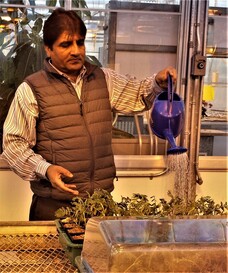 Nityananda was born and raised in a farm family in a rural mountainous village of Lumbini zone in Nepal. A quest of higher education brought him to Canada. After getting a Doctor of Philosophy degree in plant science from University of Saskatchewan in Canada, he has been working as a research scientist in Agriculture and Agri-Food Canada. He is a life member of the Association of Nepalese Agricultural Professionals of Americas, where he currently chairs the Resource and Capacity Building Committee. hunger in a parallelogram of sunshine beyond a breezeway window ten barefoot steps from a small kitchen’s small sink grows a well-staked garden under some rabbit proof mesh not far from where an old hose seeps over moss-covered flagstones raised from seed and tidied by fussing fingers and a Mother’s wooden-handled spade, the plants come of age, jostling in their cribs and cracking the pottery coiling with ringlets, feral interests, squash blossoms, and green hairy stems, they are no longer the grower’s nurslings and have questions: why do we belong in this gardener’s dream? why not someone else’s? someone for whom a handful of berries might fill a plate too long empty slake a hunger, borne forever kale, squash, dill-weed, beets, peppers, parsley, basil and butter beans leafy foods in every color, how can there not be enough for every plate? i have no answers, she tells them, then savoring the bounty, wishing she could do more, the gardener fills her bowl to the brim, and after sating her hunger, scrapes the leftovers into the compost bin and reties the garden stakes because there are hungry rabbits too 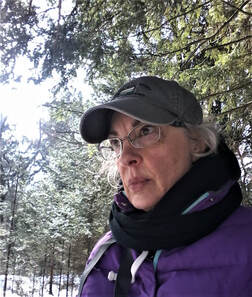 After decades of teaching literature and philosophy, Patricia now lives in Northern Michigan’s Sleeping Bear Dunes area in a cradle of sky, water and trees, where she writes and makes art about people in relation to their habitats. Past publications include small press literary journals; academic philosophy forums, Women’s Day Magazine, and a feature column for a tri-county paper. Homeless and Hungry Where do I go to be safe? Where, oh where do my children and I get a bite to eat during this pandemic? Let it be told so someone can help our stomachs not to hurt. So hungry, so cold at night! My babies can not stop crying Fear and pains reasons why. Change gotta come for survival to remain. Hard times drive us to be Homeless and Hungry Wide-eyed Innocent Children stare in Wonderment All babies know are severe pains of hunger All babies want are a peanut butter and jelly sandwich How about an apple, how about a banana, or sip of milk, some juice. Hear babies’ feeble cry Listen how they whimper. Can you please show us way to shelter and food? Food will take away pain Unite to help rid our hunger, help Mothers stay sane. Unity brings phenomenal change. Thank you for awesome help you give to ex out gloom. So my babies will stop crying So my babies will have cover over head soon 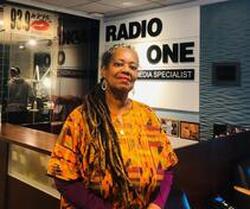 Sylvia Dianne Beverly (Ladi Di) entered this poem about food waste in the 2018 World Food Day Poetry Prize competition. A collection of her work is housed at George Washington University's Gelman Library. Ladi Di celebrated the 40th Anniversary of Host Grace Cavalieri, reading on her show "The Poet and the Poem" at the Library of Congress Experience. Hunger is the Norm The child, a mere skeleton, looks up with glazed over eyes, and a blank stare. I look back and wish to help, too feed him, but it is too late. His frail body cannot absorb nourishment. We are looking into the eyes of death. He accepts it without question. For, you see, to him starvation and death are the norm. 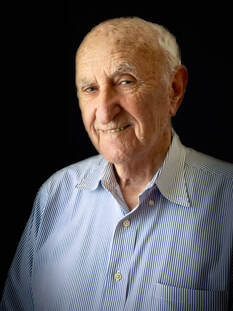 Milton says, “My poems are not entirely mine. They belong to the people and events of my passage through life. The sum of my life experiences, with more to come, I am sure. Once the dam is breached its contents flow unabridged. I also express myself through my art and craft work of dream catchers and mini sculptures. With the support of family and friends I continue to be creative and productive.” MOM, NO MORE Mom, please… I know it’s not right to say, But, Mom, there’s not enough food for My six siblings and me to eat. You see, I wanted another peanut butter and jam sandwich last night. But, you said, “Only one sandwich per child.” It’s just too many of us to feed, Mom. We are always hungry and sad. Mom, I know you are doing your best, But my stomach tells me it needs more food. Maybe if you pray another hour, God will hear your cry—and the growls of my stomach! Hunger is not the best feeling for a child. It’s not good for a growing child, you know. All I think about is eating a good, hot meal. I do believe it will get better one day. But until it does, Mom, please… No more babies. The cry of a seven-year-old boy--  Joyce Williams Graves is a native of Fredericksburg, Virginia. She lives in Fort Washington, MD (over 20 years) with her husband Glen Graves. She is a woman of faith. She has been retired for 7 years. Ms. Graves worked at the Environmental Protection Agency for 22 years for the Office of Inspector General as an Information Technology (IT) manager. She is an Entrepreneur and works as an independent skincare consultant (Jafra International) for 8 years. She has been a US Notary Public for over 30 years. Ms. Graves is a playwright. Her play is called, “Cotton Field to Concert Hall.” It was performed at the Public Playhouse (2017) and the Kennedy Center (2018). Her hobbies are painting, writing poems, swimming, walking, playing chess. Ms. Graves is a Numismatist (Coins Collector). Raspberries On our bed we lie like flatfish. Outside, stars grow older. The moon, a white cocoon, casts its image on the river. In sparse shadows a willow dangles. Along the thorn fences raspberries bleed. They remember once being the fire drawing the moth flapping its wings to flames of love. 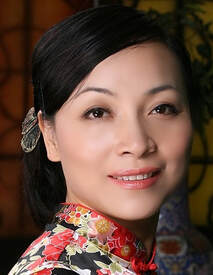 Anna Yin was Mississauga’s Inaugural Poet Laureate (2015-2017) and has authored five collections of poetry and “Mirrors and Windows” (Guernica Editions) in 2021. Her poems/translations have appeared at ARC Poetry, New York Times, China Daily, CBC Radio, World Journal etc. Anna won several poetry awards and also teaches Poetry Alive. Her website: annapoetry.com |
AboutThe poems that follow are powerful evidence that Poetry Speaks Back to Hunger! Archives
October 2022
Poets
All
|
 RSS Feed
RSS Feed